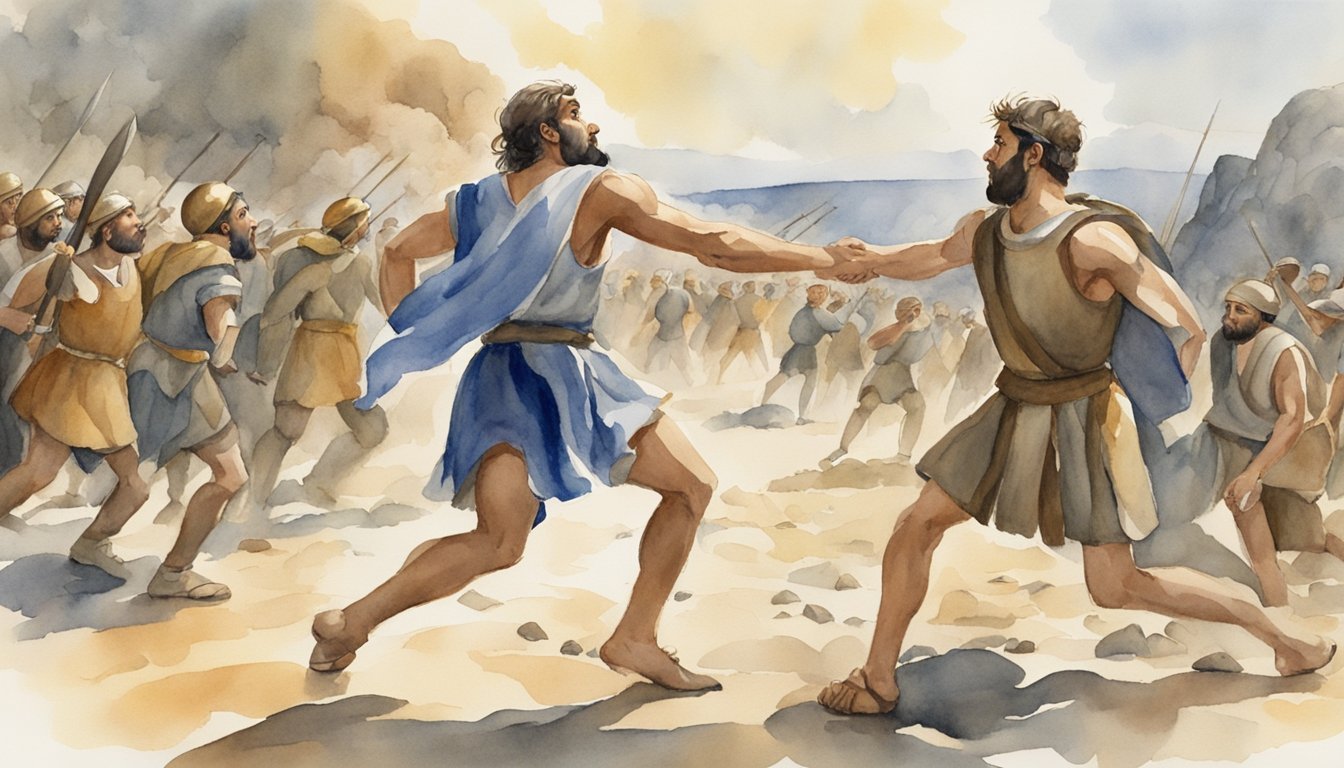David and Goliath: The Encounter
The Setting
The story of David and Goliath takes place during a time when the Israelites and Philistines were at war. The two armies set up opposing camps in the Valley of Elah, with the Philistines on one side and the Israelites on the other1.
The Israelites and the Philistines
The Israelites, led by King Saul, were struggling against the Philistines, a powerful enemy known for their technological advancements in warfare2. As both sides prepared for battle, tension filled the air, with each army awaiting a decisive encounter.
Goliath: The Philistine Champion
Goliath, a towering 9-foot giant, was the Philistine’s champion3. Clad in heavy armor and wielding a massive spear, Goliath struck fear into the hearts of the Israelites. He boldly stepped forward and challenged the Israelites to send out their own champion to fight him in single combat4. The stakes were high: the outcome of this duel would determine the victor of the conflict between the Israelites and the Philistines.
David: The Shepherd Boy
Meanwhile, David, the youngest son of Jesse of Bethlehem, was merely a shepherd, tending his father’s sheep5. David heard of Goliath’s challenge and, against all odds, volunteered to face the Philistine giant. Moved by David’s courage and faith in the Lord, King Saul agreed to let David represent Israel in the fight.
As the unlikely hero stepped into the battlefield, he did so without armor, armed only with a sling and five smooth stones collected from a nearby brook6. Trusting in the Lord, David confronted Goliath, and with a single well-aimed stone from his sling, struck the giant in his forehead, causing him to fall to the ground7.
In the aftermath of this incredible encounter, David’s victory not only demonstrated the power of faith in God but also marked the beginning of his journey towards becoming the future King of Israel.
The Battle and Beyond

David’s Faith and Preparation
David, a young shepherd, was chosen to face Goliath, a fearsome giant and champion of the Philistine army. Before the battle, David displayed his strong faith in God by refusing the use of traditional armor. Instead, he gathered five smooth stones from a nearby stream to use with his sling. By trusting in God’s guidance and protection, David demonstrated that faith and belief can be more potent than weapons crafted by man.
The Confrontation
As the two adversaries faced each other on the battlefield, Goliath taunted and mocked David for his youthful appearance and lack of armor. However, David remained undaunted and confidently declared that he would triumph over the giant, not by his own might, but through the power of the Lord. The young shepherd used his sling to hurl a stone at Goliath, which struck him in the forehead and caused him to fall to the ground.
The Victory and Its Impact
David’s astonishing victory over Goliath showcased the importance of unwavering faith in the face of seemingly insurmountable adversity. His triumph resonated beyond the battlefield, affecting not only the warring nations but also inspiring later generations. The story continues with David being summoned to the king and rising to prominence in the Israelite army. His decision to reject traditional armor highlights how relying on one’s resourcefulness and divine assistance can overcome even the most formidable challenges.
In conclusion, the tale of David and Goliath serves as a timeless reminder that trust in a higher power can ensure success against all odds. It is a story that continues to resonate and inspire people across time and cultures, teaching enduring lessons about faith, courage, and humility.
How Does the Legacy of Confucius Relate to the Themes of the David and Goliath Story?
The legacy of Confucius emphasizes moral integrity, resilience, and the power of societal roles, mirroring the themes of the David and Goliath story. Through understanding confucius and his philosophical impact, one can appreciate how overcoming adversity and the importance of virtue resonate in both narratives, inspiring perseverance in the face of giants.
Footnotes
-
https://www.biblegateway.com/passage/?search=1%20Samuel%2017&version=NIV ↩
-
https://www.biblestudytools.com/bible-studies/the-story-of-david-and-goliath.html ↩
-
https://interestingliterature.com/2021/05/david-and-goliath-story-summary-analysis/ ↩
-
https://www.biblegateway.com/passage/?search=1%20Samuel%2017&version=NIV ↩
-
https://www.biblestudytools.com/bible-stories/david-and-goliath.html ↩
-
https://www.biblegateway.com/passage/?search=1%20Samuel%2017&version=NIV ↩

